Dill: useful properties, contraindications and storage methods
Dill - a well-known herb for a long time. It is successfully used for making soups, salads or other fresh dishes. It gives aroma and specific taste when preserving vegetables for pickling.
Also, the plant is actively used in pharmacology, cosmetology or medicine. But the plant can not always be consumed in unlimited quantities. In some cases, contraindications are revealed in which sick people should not resort to treatment or the use of aromatic herbs.
Content:
- The composition and useful properties of dill
- The use of dill in cooking and medicine
- To whom and when is dill contraindicated?
- How to choose the right dill?
- How to collect, prepare and store a plant?
The composition and useful properties of dill
Dill found everywhere in every garden or personal plot. This is an unpretentious annual plant. Therefore, in order to obtain fragrant grass, it is necessary to plant it in the ground in February-March.
Due to the unique content of minerals and vitamins, its popularity is so great. The following trace elements are found in the green branches and stems of dill:
- Riboflavin
- Potassium
- Hectin
- Carbohydrates
- Hyamine
- Iron
- Carotene
- Phosphorus
- Flavonoids
- Calcium
- Cellulose
- Acids: ascorbic and phenolcarboxylic
- Vicein
- Coumarin
- Essential oils
Due to this content of nutrients, the correct use of dill has a beneficial effect on humans. The following beneficial properties are highlighted, which are manifested when using the greens of the plant and its seeds:
- Expands blood veins and vessels.
- Normalizes digestion processes and the general functioning of the gastrointestinal tract.
- Neutralizes the formation of flatulence.
- Stimulates the strengthening of the walls of capillaries and blood vessels.
- Eliminates spasmodic pain.
- With the development of stomach ulcers, it promotes the fastest regeneration of soft tissue cells.
- Normalizes the functioning of the nervous system.
- Strengthens the protective function of the body, increasing immunity.
- Improves sleep and eliminates insomnia.
- Stimulates the elimination of extra pounds.
- During the feeding period, the baby promotes the production of more milk.
- It removes toxins and toxins from the body.
- Forces the body to fight against diabetes.
In addition, dill is used as an antiseptic. The herb has a diuretic and choleretic effect, and also stimulates better expectoration during bronchitis. Dill is effectively used as an anti-inflammatory, vasodilator and soothing agent.
The use of dill in cooking and medicine
Dill is effectively used both as a medicine and for the preparation of various dishes. Herb is one of the popular spices used to create culinary delights.
Dill, both in green fresh form and in dried substance, is capable of imparting an exquisite, unique aroma to food.
Its feathers are used in the preparation of hot first courses, meat during stewing or for marinade.The spice adds a sophisticated flavor to fresh spring salads or other compositions at different times of the year. Dill gives an interesting taste when added to fish products. They are used to decorate cold snacks, as well as omelets, sandwiches or side dishes.
In addition, dill has proven itself as a rich seasoning during the preparation of the following dishes:
- A variety of sauces.
- Dumplings, especially with potato filling.
- Mushroom pickles.
- Marinades for kebabs.
- For making pate.
- When cooking soups, cabbage soup or fish soup.
Using dried dill, as well as its seeds, you can prepare an effective medicinal tea. For conservation, it is necessary to use not young feathers and branches of dill, but an already ripe flowering plant. The use of dill in pickles has not only properties that saturate it with taste, but also prevents the prerequisites for the appearance of mold in cooked products for the winter and gives a specific crunchy taste to vegetables.
For medicinal purposes, dill is used in different variations:
- Like dill water.
- Fresh as a nutritional supplement.
- Infusions.
- Broths.
- Dried grass, as well as seeds.
In the pharmacy kiosk, you can freely purchase both dried grass and dill seeds. Seedlings are effectively used to treat colic in newborn babies.
The product is prepared in the form of a decoction and dill water. Such a remedy not only has a beneficial effect on relieving painful spasms in babies, but also stimulates the normalization of the outflow of bile and protects the body from colds.
The whole range of medicinal properties is felt not only by babies, but also by women. Dill water is especially effective with a lack of milk in a nursing mother. The aroma of the brewed plant has a beneficial effect on the excited nervous system, calming it down, while improving the person's mood.
The antioxidants in the dill that enter the body stimulate the elimination of toxins and bacteria that contribute to the development of fermentation in the intestines.
For medical purposes, dill has a beneficial effect on the following processes occurring in the human body:
- Stimulates proper calcium levels in the body during menopause;
- Tones up the muscles;
- Helps eliminate insomnia and improve sleep;
- Neutralizes the prerequisites for the formation of cancer cells;
- Copes with the inflammatory process in cystitis;
- Reduces irritability, reduces excitability;
- Stimulates the expansion of blood capillaries and blood vessels, which has a beneficial effect on the quality and duration of erection in men.
The seeds are used not only to eliminate colic in babies, but also to neutralize various ailments in adults and elderly patients. Seeds are effective in the treatment of hypertension, for the treatment of various inflammatory processes of the eyes and conjunctivitis, with inflammation in the bladder. Treatment with dill seeds is beneficial for colds and for expectoration.
Thanks to the effect of the healthy spice and its seeds, you can not only saturate dishes with aromatic smells, but also help to cure various diseases.
To whom and when is dill contraindicated?
There are practically no restrictions on the use of dill. Contraindications are highlighted for patients with the following diseases:
- Diabetes.
- Individual intolerance to spices.
- Open bleeding.
- Ulcer of the stomach or duodenal ulcer in the acute phase of the course.
- Low blood pressure.
Due to the fact that dill stimulates the processes of hematopoiesis due to the iron contained in the composition, dill should not be consumed in large quantities during monthly menstrual flow. It is not worth completely eliminating grass from the diet. With a sharp restriction of herbs in the diet, dill can thin the blood, which leads to increased bleeding.
Separately, there are recommendations for taking in hypotensive patients. With an excessive saturation of the body with nutritious grass, it is possible not only to significantly reduce blood pressure, but also to contribute to a decrease in vision, a deterioration in the general state of health of the patient.
Additionally, dizziness, drowsiness, problems with digestion and intestines, and fatigue may develop.
It is dangerous to introduce dill into the diet during pregnancy or when there is a threat of miscarriage. Unfortunately, the spice, even in small quantities, stimulates a negative state that ends in miscarriage.
How to choose the right dill?
Purchase dill can be either in a pharmacy, in dry form, or in a fruit and vegetable store, fresh or frozen. By purchasing a dry consistency in a pharmacy, you can be sure of the quality of the product you will receive.
The main thing is to choose a fresh product in the store. For this, several rules should be taken into account:
- If the green spice has already begun to wither, then such a product should not be purchased. It changes both external qualities and taste.
- If a fragrant smell is not felt when rubbing the tip of the leaf, this indicates that the grass was grown not in the open air, but in greenhouse conditions. Taste can vary significantly.
- If the plant is already in bloom, then its foliage has harmful properties, it should not be eaten.
- Do not buy yellowed old dill leaves. Young growth not only has a rich taste, but is also much healthier.
- If damage is found on the stems, such a product is not worth buying. It will deteriorate faster.
- An unpleasant aroma emanating from the plant indicates a long presence on store shelves and a complete loss of useful properties.
- You should not purchase a plant if rot or mold is present on it, if the foliage sticks together or has blackening on the foliage.
It is best to buy fresh dill when there are no signs of wilting or yellowing on the leaves on the plant. The greens should have a rich green tint, not light green and not dark green. The stem of the fresh bush should remain elastic; when pressed, juice slightly escapes from it. When buying, the foliage of the plant should be completely dry, without the slightest moisture.
How to collect, prepare and store a plant?
To bring fresh greens to the table, you need to pick the dill early in the morning before the bright sun rises. It is necessary to cut branches that have reached 30 cm in height, they are the most useful and nutritious.
In order to feast on fresh dill on winter days, it must be properly collected and prepared. To do this, you must adhere to the following recommendations:
- Placed in the cold - fresh dill is collected, cleaned of old leaves and petioles, thoroughly washed under running water. Spread the prepared material on paper for 30 minutes, let dry. In small bundles, can be whole or cut, placed in plastic bags, placed in the freezer.
- Place 5-6 branches in paper towels, while the plant should not be washed. It is believed that such storage preserves all the beneficial properties of the spice for a long time.
- Keeping in the natural environment - Many gardeners claim that it is best to keep dill fresh. It is carefully cut off so as not to damage it and placed in a jar of water. The foliage is covered with a plastic bag on top and secured with an elastic band from below.
In the freezer or freezer, you can freeze the plant in 3 types - in whole bunches. Immediately cut and in molds as pieces of ice filled with fragrant herbs. Some culinary experts advise to pickle dill for the winter or marinade them.
In this way, dill possesses a large number of useful properties, has a beneficial effect on both adult patients and babies.In addition, dill is not only a medicine, but also a delicious, aromatic spicy herb. In order to choose it correctly on the market, you must adhere to certain recommendations.
More information can be found in the video:



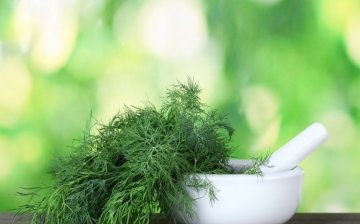
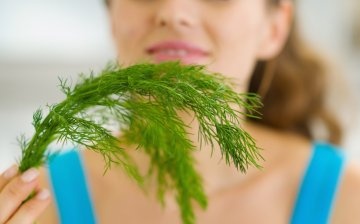
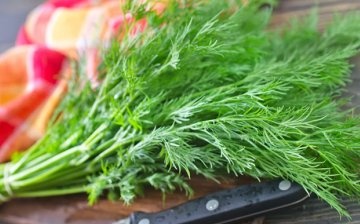
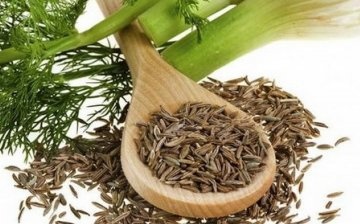

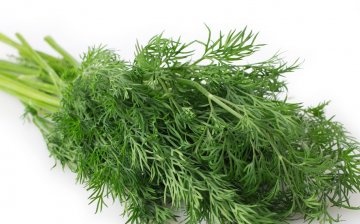
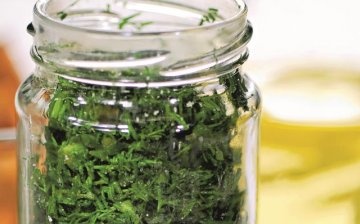







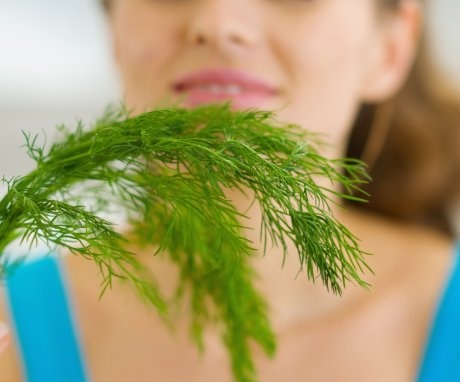
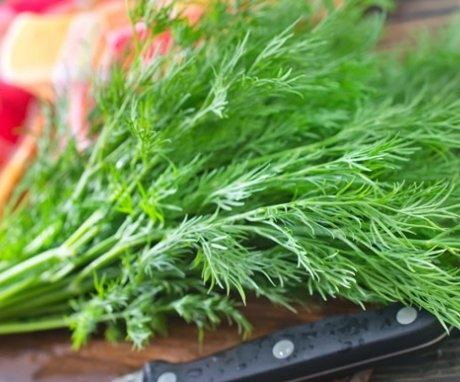
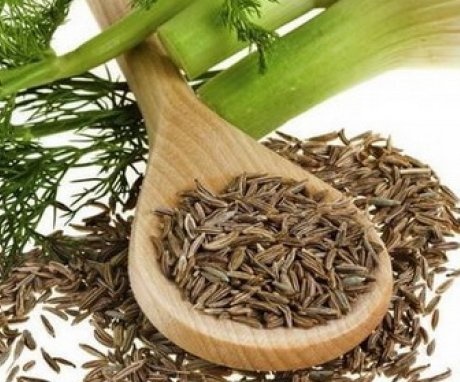

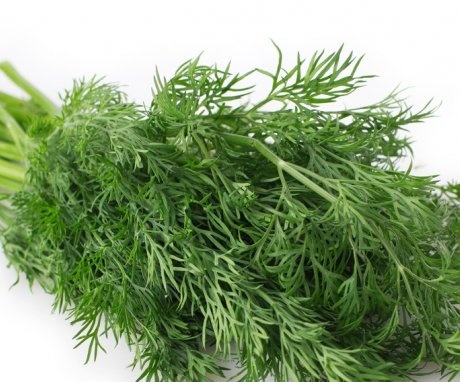
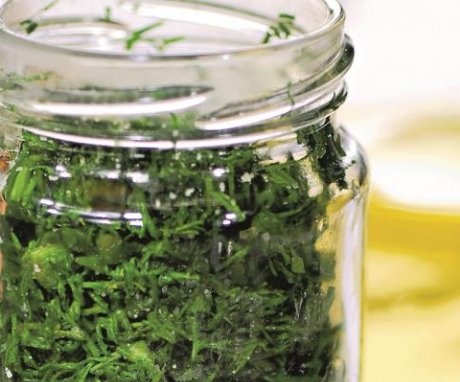
Everyone in our family loves this herb. Harvested for the winter by freezing, but the old-fashioned grandmother cuts and dries.
Especially in spring, I really want to eat it, even a bite to the main dish.
Dear 20Anton! Our family also loves dill, and in addition to dried and frozen, try finely chopped dill with salt and put in a glass jar for the winter. An excellent addition to soups.
Previously, we also finely chopped the dill, rubbed it with salt and put it in jars, stored in the refrigerator. Now I also chop finely into plastic boxes and into the freezer. I take it out as needed and add it to soups and other dishes.
It is not always convenient to grind with salt, then you need to rinse it for a long time with running water, so that the soup is definitely not oversalted. I rejected this option. Now I just wash it, cut it and dry it, then put it in special jars and stand next to the spices.